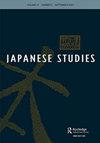Outsiders in Disasters: Racism, Rumours, and Fiction in Post-3.11 Japan
IF 0.4
Q3 AREA STUDIES
引用次数: 0
Abstract
Abstract The 3.11 triple disasters occurred at a moment of increased anti-immigrant sentiment in Japan exemplified by the activities of the Zaitokukai, a particularly anti-Korean right-wing group. This xenophobic sentiment provided fertile ground for the spread of malicious racialized rumours blaming foreigners for an array of crimes in the aftermath of the disaster. This article considers the mechanisms through which post-disaster narratives, including rumours, can work to either reaffirm the boundaries or create an empathetic bridge. In addition to the rumours, the article explores Japan Sinks 2020 (Nihon chinbotsu 2020), an anime series about a multi-ethnic family encountering a major disaster, and Kawakami Hiromi’s ‘Gods 2011’ (‘Kamisama 2011’, available in translation as ‘God Bless You 2011’). These texts in a variety of media participate in what Michael Omi and Howard Winant (2015) term ‘racial projects’. Some portray foreigners as criminals and the others encourage a more welcoming attitude.灾难中的局外人:311后日本的种族主义、谣言和小说
3月11日的三重灾难发生在日本反移民情绪高涨的时刻,特别是反韩右翼团体再通社的活动就是例证。这种仇外情绪为恶意种族化谣言的传播提供了肥沃的土壤,这些谣言指责外国人在灾难发生后犯下了一系列罪行。这篇文章考虑了灾后叙事,包括谣言,可以用来重申界限或建立一座感同身受的桥梁的机制。除了谣言之外,这篇文章还探讨了关于一个多民族家庭遭遇重大灾难的动漫系列《2020年日本沉没》(Nihon chinbotsu 2020),以及川上广美的《众神2011》(Kamisama 2011,翻译为《上帝保佑你2011》)。各种媒体上的这些文本参与了Michael Omi和Howard Winant(2015)所称的“种族项目”。一些人把外国人描绘成罪犯,另一些人则鼓励人们采取更热情的态度。
本文章由计算机程序翻译,如有差异,请以英文原文为准。
求助全文
约1分钟内获得全文
求助全文

 求助内容:
求助内容: 应助结果提醒方式:
应助结果提醒方式:


